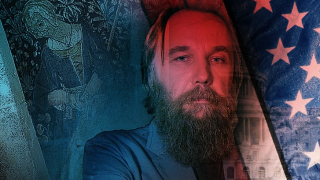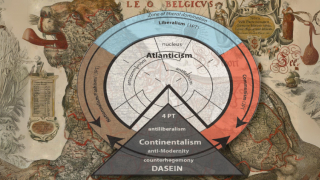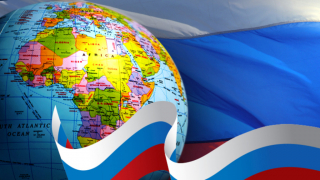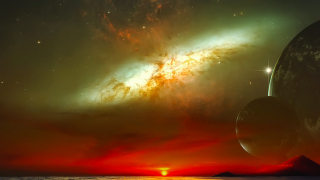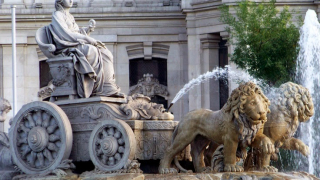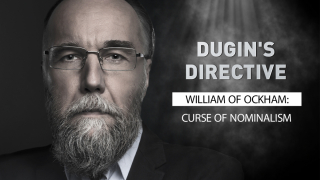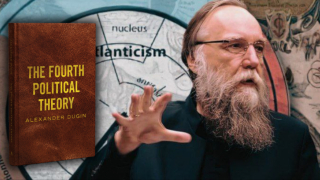The Realm of the Fourth Political Theory: Contributions
Foreword
It has been some years now since we in Brazil have dedicated ourselves to the study of the Fourth Political Theory, created by Russian Philosopher Alexandr Dugin, resident in his hometown Moscow. One of the leading tenets of this theory is the assertion that each civilization has the right of an autochthonous self-understanding and only this could bring about a world of social justice and equanimous improvement. The natural unfolding of this idea is the multipolar world, established upon multiple civilizations instead of one or two sovereign powers, whose sovereignty is the direct product of the engulfing of the riches of this plurality. To Brazilians and other Latinamericans, this reflects a deep desire of our souls, once the prerogative to be ourselves has been threatened since our inception. Thus, most of our political affairs has been a struggle between the few of us awaken enough and another few, long decided to handle our spiritual wealth over to the families that ruthlessly want to own the whole world. During this process, the absolute majority is just sleeping for centuries.
This document is fruit of a series of conversations and writings between Professor Alexandr Dugin and I over the last years, plus some of the investigational processes that are taking place at CEM thanks to our very dedicated researchers, to whom I am immensely grateful. My intention is to introduce the development of some of our ideas. I hope this can be an inspiration to other thinkers and to people in general who want to awaken from the soporific life of gadgets, social media, celebrity cult, total immersion in laboratory-produced news, sweetened beverages, pharmaceutical solutions, cosmoliberal agendas and so on.
I wholeheartedly thank Professor Alexandr Dugin for his openness and trust.
CEM
The Russian-Brazilian Center for Multipolarity Studies is an education and research institute with headquarters in São Paulo, Brazil, whose main activity is knowledge production. Our goal is to provide the tools for both the private and professional realm so that all of us may consciously choose our historical destiny.
We proportionate the encounter between several disciplines that help us to build a critical reading of the world, acting in the academic, cultural-artistic, military, political and informational contexts.
- We promote courses, research, publications, cultural and artistic events, interinstitutional meetings and consulting.
- Our central geographic areas of interest are: Brazil, BRICS and Latinamerica.
- We defend Multipolarity and relentlessly stand for our right to epistemic sovereignty.
Exposition
The Frame of the Fourth Political Theory
The Fourth Political Theory is the theoretical ground to a new approach concerning the essence of The Political (Carl Smith’s Das Politische) to the 21st century. We assume that we live in an era—Modernity, already in its way to Ultra-modernity—whose main feature is the subjection of the world as we traditionally see it. It happens as an imposition coming in the form of a loaded political agenda, whose actors are international agencies, movies, spokesmen; the ways are as diverse as celebrity cult, creation of subcultures, gadgets, social net, pharmaceutical psychology, all of them with, of course, huge quantities of money involved. This variegation serves the purpose of naturalizing the post-human agenda and creating a sense of estrangement towards the ones who do not cope with it.
We believe that this state of things dehumanize us in our cardinal characteristics and that we must reassure our right to be who, what and how we are without intervention. Many of us—the majority of the world, actually—like to have a connection with our ancestors and hope that our descendants will be willing to have a liaison with us as well. Therefore, we reject all traits of the Modern Era that interrupt this link. Henceforth, the Fourth Political Theory is a bridge between the eternity of the values that lie in traditional ways and lifestyles and the future where all these values can be lived freely and peacefully.
Our criticism against Modernity and its agenda is a radical one—and it must be at least as drastic as the coercion being done by those who want to destroy the multiplicity of human cultures through the means of enforcement upon us of something that some anonymous people (or not so anonymous) are fabricating in their sociological, technological, military, informational and medical factories.
Nevertheless, our refusal of Modernity is pretty misunderstood: we refute it from a metaphysical point of view, but usually people think we want to get back to candle-lights and medieval costumes. Their inability to think more profoundly is already part of the thinking scheme of Modernity: instead of promoting a deeper analytical capacity, which would match the alleged “progress” of our societies, our generation thinks in logemas, that is, the smallest unit of thought, frequently in the form of slogans or even just visual logos. Logemas could also come in the form of dualities, where there is no room for the gradient that expresses real life. The action correspondent to this level of thinking is always a reaction—no time to reflect upon. A typical reaction could be: “these stupid people, fascists/communists” (depending on how the speaker fears each of them), etc. By using the fascist/communist “adjective”, they “win” the argument and go home satisfied, without having really discussed anything and leaving the problem exactly where it was before. So, it is not hard to imagine that someone else takes full advantage over these people. But they will not notice, as long as new gadgets—software, hardware and subculture—get to the stores or social media in the next season.
Moreover: if there were any possibility of a real reflection, probably a big void of meaning would be found, because of the lack of a truly human culture. Thus, it is easy to see that the discussion of Modernity at the level of Metaphysics is quite a hard task, one that most people simply don’t have the intellectual structure to undertake.
We can see from all this that the political theory that has won the "representation rights" of Modernity, which is liberalism, has long surpassed the political theory realm, becoming a whole set of thinking and acting habits, institutions, policies at domestic and international spheres and a general cosmovision deciding on behalf of people what they should think about any subject. Due to that, we call it cosmoliberalism.
Following that, it must be understood that the Fourth Political Theory is not only a political theory as well. Here, we must respond with our real presence, with the concrete beings that we are. This makes of the Fourth Political Theory more of a metatheory — a theory that is willing to examine itself as much as its object; it is a kind of dance between its interior and exterior forms, in which we all participate with our authentic persons, our actual actions, not only with beautiful words or internet profiles. This metatheory brings along an urge to its own discovery, discussion, solution and completion; and it is also a challenge to the overcoming of the world of the above mentioned internet profiles in favor of a legitimate presence in the world. This call goes especially to the young, so used to the new forms of sociability taught them by the social nets. This is the reason why we are using the term Metatheory of Presence in Brazil. We are all invited by it to explore the dimension of "really being". This will lead us to the subject of this metatheory: the Dasein.
Development
Dasein
The subject of the Metatheory of Presence is Dasein—a difficult concept, issued from Martin Heidegger’s categories. And, on the theoretical level, it must be so. However, there is a plain correspondent reality to it on the level of the everyday life: the People. The People as a concept, understood existentially and existing pragmatically. Dasein existent völkisch, where "Volk" means "People." It is not a quantitative concept, but a qualitative one. The People is not “population”, nor is it the individual. It is the existential and corporeal reality of History dealing with Death. Also, it is the semantic ontology of human: history, language, consciousness, way of thinking, rationality—where only the people themselves define what must and what must not be, within their frame of time, space and anthropology. And, of course, although The People is unique in itself, there are several peoples.
This is the basis of the Theory of Pluriversum, on which the Theory of Multipolar World, a new approach in the realm of Geopolitics, is laid. This is the best concrete possibility for the diversity of peoples to co-exist, instead of what is proclaimed by unipolarity, which is the soft or hard imposition of a single culture: Western one.
The Attack against the human phenomenon
The human phenomenon is not something given, although it is usually taken for granted; it is something happening in the sphere of the becoming, as a process with no given end either. The person becomes human under the guidance of cultural patterns, whilst the the opposite is also true: under the exclusive direction of one’s own standards, the person becomes a non-human (a post-human, a trans-human or anything in the like). The construction of this post-human is a project taking action right now, before our eyes: it is the destruction of all collective and communitarian aspects of human life, such as nation, religion, ancestrality, sex—even humanity itself is being challenged as a given value (we could think of those who claim they simply do not feel as humans, but animals, plants and so on). This complex project aims to bring into question the normality of being human and advocate for a better, more improved kind of race, to which none of the shared cultures will be sufficient anymore. To supply for that lack, many types of subcultures are being built (emos, transgenders, hipsters, antifas, vegans, outcasters, otakus, etc.). Moreover, contesting them may lead one to be ridiculed, ostracized or sued. As a result, a war between Culture and subculture has been launched.
This subject is vast and deep; still a simple difference between Culture and subculture can be traced as follows: Culture discusses, represents or transforms the great themes of life—God, death, love, identity, the soul, the improvement of a certain people’s culture. On the other hand, subculture is all about itself: what we want, how we differentiate from them, what we wear or eat, how we move, which vocabulary we use, and so on. No profound questions, no big themes, no transformation, no improvement.
When the heads of cosmoliberalism believe that one of those subcultures has a stronger/faster power to destroy the traditional culture of a place or people, they create mechanisms to impose such universe as “natural” upon all of us. That's when we start watching the emergence of singers, actors, ongs, scientists, youtube videos starred even by children—all these acting as spokespeople of these ideas. The message is clear: we must accept the new ways because all tradition is old fashioned, unscientific and, therefore, wrong. This legion of saviors are here to teach us how to live a "better, more scientific and democratic life".
Populism: an expression connected to the metatheory of presence
Many countries are now witnessing the rise of populism in the electoral practice. This is a very eloquent phenomenon, but its understanding is not so obvious.
Populism has ascended as an alternative to a series of elements concerning the politics that is being practised today:
● The almost complete lack of confidence of the people in their elites, which are overtly considered to be working in the defense of their own interests;
● The change of direction in the political axis, from horizontal, represented by the right-left dialectics, to vertical, demonstrating the poignant division of society in a ring where the adversaries are “the top” and “the bottom”;
● The fact that the distance between the people and the governing elites mean that there is a terrible gap in the understanding of each other’s ideological fabrics, frequently resulting in a surprise in the ballot box—what can be read as the people going through an untamed phase, electorally speaking.
The populist candidates are the offspring of this situation, once, on the other hand, they are the only ones capable of bringing people back to the political game precisely because they do represent them. Ironically, this is the very feature that make political analysts despise them and populism as a second category way of doing politics, through adjectives such as demagogy, lack of rationality, absence of exemption, etc.
But the People intuitively refuses the liberal-globalist roadmap for the future: technocentric elites, capitalism, imposition of Western norms as universal ones and the like. Therefore, we are frequently watching the mainstream media push the People towards the populists, because the characteristics pointed out by the former as bad ones are usually understood by the latter as belonging to either the right or left-winged politicians, who are definitely thought of as being disconnected to the People's actual life. The populists, in turn, are felt as charismatic leaders who seem to be talking an honest talk to palpable people; politicians who do incarnate their Weltanschauung, their necessities, their frustrations with the political scene and processes as well as the strength, will and commitment to make a popular government. Populists today are understood as if giving back the res publica to the true public.
We could say that contemporary populism embodies several of the Metatheory of Presence's main tenets (as much as Marxism emerged after the beginning of the workers’ struggle, for instance). It is an anti-liberal move.
The foundations of the People
Liberal Modernity refuses and ignores the ontology of the People, replacing it for ideologies issued from the three political theories of the 18th, 19th and 20th centuries, respectively:
● Liberalism: a sum of individuals;
● Communism: two antagonistic economic classes;
● Nationalism: a political body of individuals factually united to defend common interests (as in the bourgeois nationalism, fascism and nazism).
Now, there is an important turn, here: the People is recognized as the source of any real legitimacy inside all modern constitutions. However, it is immediately translated to the ideological reading regarding the optics of some of those three political theories. In our days, it is routinely the first one, purely liberal, anti-social and anti-national, consolidating policies on individualistic and materialistic principles. There is no chance to read the People in its truthful ontology, with its genuine attributes. But then, why is the concept of the People, which has been ignored, denied or profoundly reinterpreted, at the core of the Law in Modernity?
The People paradigm in Modernity stems from Renaissance. Renaissance, fighting against the transcendentalism of the Middle Ages, has introduced the Greco-Roman concept of the People to the field of political thought. It had then two faces: a platonic one, which can be either apollonian or dionysian (Logos of Apollo and Logos of Dionysius); and a materialistic, chtonic one linked to the Logos of Cybele. Here, the concept of Logos (capital L) means the identity realm as a philosophical paradigm, which gives birth to a certain worldview. Renaissance had both divine and satanic parts (in itself a dionysiac quality), but Modernity has chosen exclusively the satanic ones. It is, so, the victory of the Logos of Cybele.
The same goes for the concepts of Renaissance and concretely for the People. According to the Renaissance way of thinking, the People is immanent, though not at all materialistic, quantitative; it is dionysiac. In Renaissance parlance, the Man is magus, a lesser god (like in Pico della Mirandola); but never a Titan, nor a giant, nor Lucifer attacking the Heavens. Contrary to this, in Modernity’s apprehension of Renaissance, the People has become a Titan and a quantitative concept—hence the ideological interpretations of the last political theories, all of which are essentially titanic, leading to the development of materialism, individualism, racism, attachment to technology and sciences, defeat of the magical and spiritual, etc.
We suggest the return to the Renaissance’s understanding of Man’s nature and, consequently, of the People’s. The People is a political (social, communal) manifestation of Man. Thus, we need not change the core of our constitutions; we must devoid them of the techniques used today to construct this ideological perception. Man is not an individual. The individual is a robot, a bearer of artificial intelligence. The essence of the posthumanism/transhumanism is the mechanical backbone of the individualistic hermeneutics of Man and it is also the last stage of globalist liberalism. Therefore, the People is the ultimate line of defense of humanity against the dark alienation of Modernity. The Metatheory of Presence must fight for the restoration of this spirit of Renaissance and declare liberal individualism as an illegitimate usurpation of a series of crucial concepts. The liberals are the junta that has hijacked the constitutions and deprived the People of its political rights. Hence, our anti-liberal (and, by extension, anti-Modern) fight has a constitutional basis. Liberals, knowingly or not, are the servants of the global liberal dictatorship, whilst we are the Resistance, battling for our inherent constitutional rights. It is an uttermost combat for human dignity.
Neo-Renaissance
The idea of Neo-Renaissance originates from the craving to unite our splashed inner characteristics once again, fixing the internal laceration that Modernity has caused—and cosmoliberalism tries to shut only in the measure of its own interests, generally in the form of "pacifiers" that we have explained above (drugs and prescription drugs, games, reality shows, celebrity heros, etc.).
As said before, we want and need to bridge past and future by the means of the persons that we are, the values that we promulgate, the ethics that allows for a continuation of the best features of our identity. We know that we are facing the task of building a new kind of society: a neo-traditional one. And now we are advancing some of its aspects.
We talk about a Neo-Renaissance instead of “New” because “new” is the hallmark of Ultra-Modernity, displacing everything that has existed and worked well before its spokesperson’s time. The Neo, on the other pole, is the binding of what is eternal, that can be found in the Traditional, respecting, and not ignoring, our present modus cogitandi, instead of simply throwing us in a past which we are not able to deal with anymore.
The intention of this neo is overcoming, arching over, healing.
The operating system
Modus cogitandi refers to ways in which thinking and conceiving are possible to us. Projected on a timeline, we could say that the pre-modern era gave birth to the chaos modus. Chaos here does not mean a messy reasoning, but a pre-logic one, something diverse from the logics we are now used to. Chaos is firmly present in myth, mythology, habits, arts, the supernatural, mystic, religion and spirituality.
Chaos has accompanied us for millennia and it is still dominant in equilibrium societies (indigenous groups that remain more or less untouched by contact with progress societies, such as many existent in Brazil, Africa, Oceania). This does not mean, of course, an alienation from logos, the other modus cogitandi type that came along with chaos in the Pre-Modern Era, creating the Traditional Civilization and giving birth to logics (please, do not be confused by the previous use of the word Logos, which, for matters of disambiguation, is spelled in this document with capital L; this Greek word is indeed full of meanings). Ancient societies like India, Egypt, Greece, Israel, Persia, China are examples of the rise of the logos accompanied by chaos, resulting in what we could denominate chaologos: the pre-logic in total empathy with logic, stimulating the awakening of ethics, metaphysics, empires, religions, civilizations.
The Modern Era, though, put a break to this process, claiming, through the advent of the scientific method, that chaos could no longer exist, that it was maleficious because it was based on a hard-to- -control kind of order (which is true); this era made all possible efforts to suppress chaos from the minds where Modernity made its first appearance—Western Europe; and later it tried to eradicate it through all sorts of violent methods in the places subject to modern colonization: America, Africa, Asia and Oceania—the whole world should intellectually operate according to the will of the colonizers.
The obliteration of chaos was very successful in Western Europe, once Modernity thrived there as a natural phenomenon, supported by a lot of other manifestations. Nonetheless, it was disastrous anywhere else, where it represented right the opposite. The terrible result was the formation of a monstrous intermediary modus cogitandi, archeomodernity. Neither one of its two matrices—chaos and logos—works well. Peoples affected by archeomodernity cannot behave entirely in a logical mode, on one hand, and are unable to completely access chaos, doubting its contents, meanings and processing capacities to solve questions that are eminently modern. So, as a general rule, European colonized peoples have to deal with this noetic disease, without even knowing appropriately of its existence.
Yet, mankind, not having being created by itself, cannot get rid of its innermost characteristics. The need for chaos can be clearly attested today, for instance, through the vast world of comic books, tv series, movies, cosplay and videogames. All kinds of fantastic creatures and universes are displayed to absorb and give life to a mythical world that has no other expression in our days. But, of course, the logical minds (which, by the way, deprived of their counterpart, end up working through logemas, as we have discussed above) transform this need for chaos in commerce and domination, profiting precisely from what they have forbidden us by allowing us to buy it back from them. Nefarious.
We have to clarify that, in themselves, all modi cogitandi are normal and part of the regular development of humans. None of them belong solely to one race or one lifestyle. What is disastrous is the forced separation of one modus from the others, as much as a hand cannot walk around without its owner. There is no use and no need for a single hand. The person, in its entirety, is what is needed—therefore, it must be fostered as such, as a whole.
As a matter of fact, we are already watching the birth of another modus cogitandi: techné. Notwithstanding, just as we witnessed throughout history the disassemblage of chaologos in order to grant exclusivity to logos, we are now observing the same procedure concerning logos: there will be no need to be logic anymore, because tiny chips, implanted inside our bodies will account for all available knowledge. Our logical operations will be supplanted by state-of-the-art computers, therefore becoming completely unnecessary (the little use we make of memory, easily attested by the ever decreasing quantity of telephone numbers we really know by heart now, is a good example of what is to come). What is being prepared is the world of cyborgs, chimeras and all kinds of artificial intelligence to replace the homo sapiens sapiens altogether—that means you and me.
Thus, we can deduce that our great endeavor is to find the means to accommodate all three modi cogitandi in this Neo-Renaissance construction. We have to be up to it, until we are ready for a fourth one... yet to come.
Eschatology: the language of chaos
For all this, we many times make use of eschatology and its language to better enunciate the significance of the events that take place in this time frame according to our chaos understanding. Therefore, the strong images found in religious narratives, philosophical mythology or artistic expressions are recurrently preferred as a means to communicate the depth with which we want and are entitled to live our very lives and give them the meaning that we also prefer.
Nonetheless, we find unacceptable the use of eschatological images to bring violence and terror to the communities, as we see happening in our days. We use all means possible to defend a culture of peace, in which all peoples have the right to exist as they are, with the clear boundaries of respect and recognition as guides to the exchange between civilizations—and never the imposition of one over others, subtle or fierceful. On the other hand, in face of an attack, we will use the right to our self-defense, subtle or fierceful.
The concept of Renaissance in peoples with little European influence
Neo-Renaissance is not a matter of the European Logos: it will be, in some cases; however it is also a question of finding one’s own renaissance, that is to say, that which allows for a more complete modus cogitandi, in a harmonic dance between the old and the new ways. It is not at all about reviving something that is antique; the main principle is the recovering of a thinking line where the course of beauty, harmony and dignity can be transmitted along to future ages, bridging the generations gap. The movement of the Metatheory of Presence, then, is never towards the past; on the contrary, it is towards the present incarnation of eternal values that today, with and because of Modernity, cannot be found, although they have been clearly lived in all times except modern times.
Therefore, every People is entitled to—actually, has the duty of—finding out this path for itself. And only each People can do that on its own behalf, with no interference whatsoever.
For instance, Old Timbuktu represents a golden time for many westcoast peoples in Africa. So, they could chose to make their discussion in order to build their Neo-Renaissance narrative from there. The same is valid for Bali—to revive parts of the Negara organization, for example, because it could be so that it maintains values and conceptions that are extremely valuable to bring to their society cohesion, control over their historical destiny and a sense of a meaningful existence.
The rebuilding of civilizations
Concerning Neo-Renaissance, we intend to become aware of the different modi cogitandi and take back in our own (every People’s) hands the victory over the archeomodern condition and subsequent rehabilitation of the chaologos that is necessary to build great civilizations—not great as in dominant over others, but as in prevailing over one’s own problems that prevent one to live freely the realm of virtue.
Sometimes, the necessary characteristics for this duty are right at hand, because substantial parts of the identity are present, or because emblematic figures are still around. In many occasions, however, they are no longer and identity has lost the battle to the forces of colonialism of power, knowledge and values. If this is the case, a task-force must be put together to the rebuilding of the civilization from its debris, with the help of the best heads available. Every awaken human soul should embrace this assignment with joy and the highest level of commitment.
Closure
Our proposal
The culture of our days has been debased and, therefore, has become weak, so it produces feeble humans—and here rises the invitation, sometimes irresistible, to the fabricating of another species, the post-human. It is supposed to be genetically superior, with the replacement of organs, limbs or facial traces that do not go “accordingly”, with microchips that can access all information available (but, then again, only the available information, the question here being: who controls its availability?) and so on.
This is an important thing to have in mind because we have been incessantly told, at least in the last century, that we are weak. Anything can traumatize us—this is stressed—whilst the opposite is said to be untrue, once customarily signs of strength and a solid character are considered rude in our days.
So, here is our proposal: we want to bring awareness to the need of building with all our hearts, with all our souls and with all our power the identity, the values, the behavior, the institutions, the language of the People we want to be. It is a call for taking action and responsibility for one’s own historical destiny, which only happens in the communitarian realm and not in the "cozy loneliness" of our computers screens. This whole idea has to become something palpable, recognizable, something that real persons can relate to, understand, cherish, live in their daily lives.
A final word
According to Ultra-modernity, everything that is said now will be claimed wrong within, say, twenty years. Remember, though, that you will be a grandparent yourself. So, are you ready to be thrown in the trash can in your days of old? Or will you simply refuse to grow old, considering aging a disease and trying to stop it? Because these are the days we are living: we will have to work hard for the right of being both right and old.
There is a very simple test that you can make, even if you do not know much about Geopolitics or Political Philosophy, to see on what side you are. It goes like this: if your people/territory/identity accepts most tenets of the Western culture, will the best ways of your grandparents fade or will they blossom?
Make your choice. But make it quickly.



